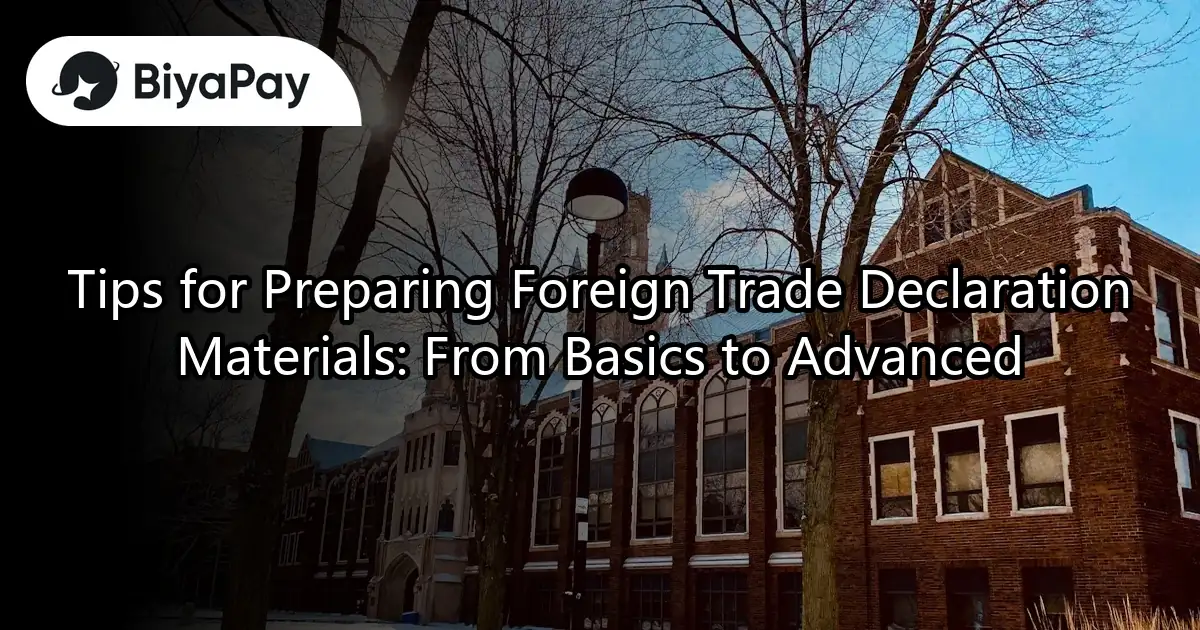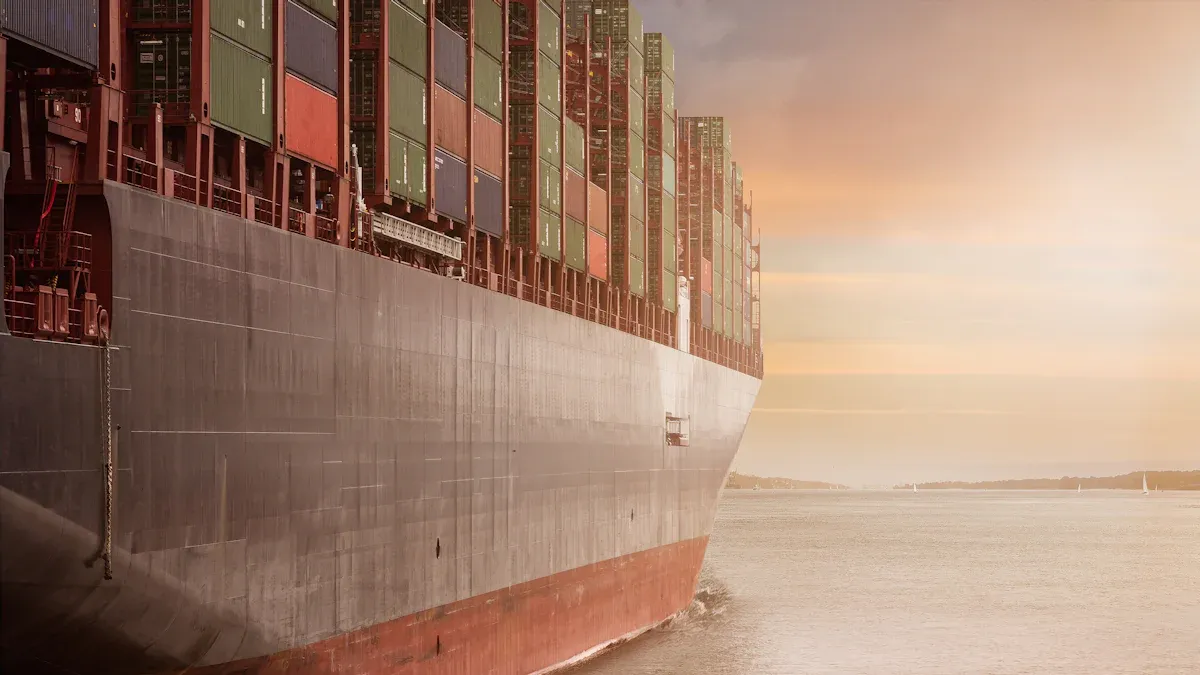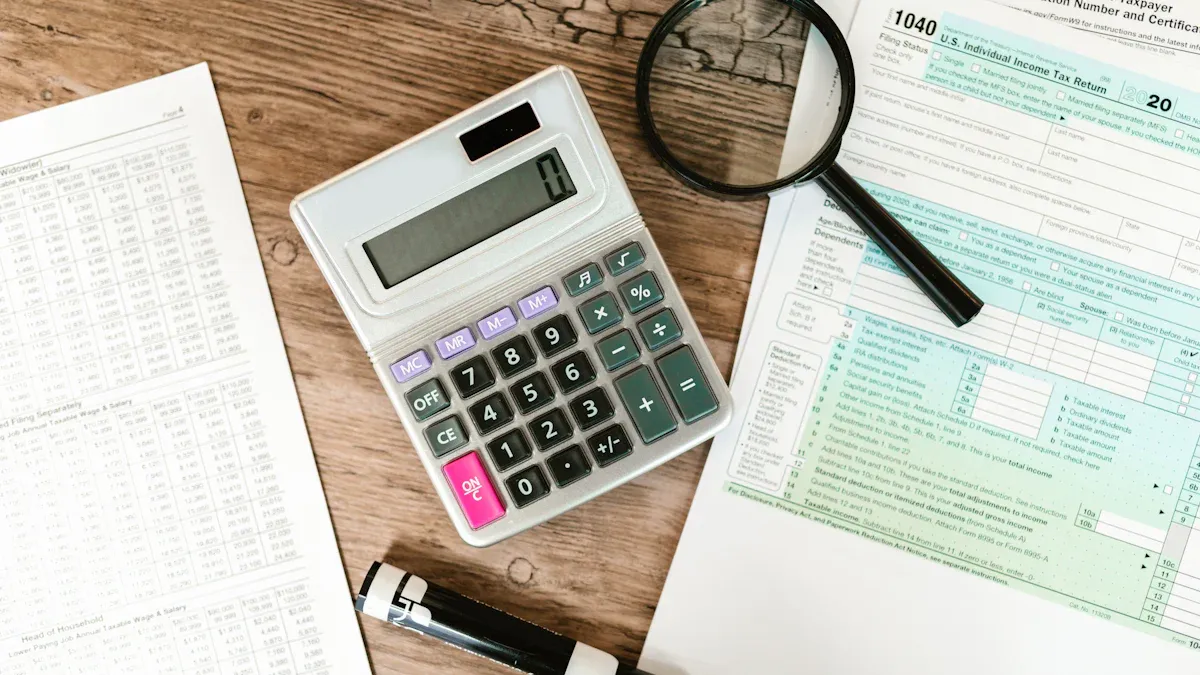- EasyCard
- Trade
- Help
- Announcement
- Academy
- SWIFT Code
- Iban Number
- Referral
- Customer Service
- Blog
- Creator
Tips for Preparing Foreign Trade Declaration Materials: From Basics to Advanced

Image Source: pexels
The preparation of foreign trade declaration materials is a core component of successfully completing import and export operations for businesses. The accuracy of declaration materials directly impacts customs clearance efficiency and the success rate of operations. For example, Guangzhou’s “Single Window” platform simplifies the declaration process through one-time data entry, reducing customs clearance time to 1-2 days for businesses in the free trade zone. This efficient model fully demonstrates the importance of material preparation.
However, many businesses often encounter issues such as incomplete materials or format errors in practice, leading to audit delays or even declaration failures. The complexity of foreign trade remittance declaration requirements also poses challenges for some companies. To help you improve declaration efficiency and reduce errors, mastering systematic material preparation techniques is particularly important.
Basic Preparation of Foreign Trade Declaration Materials

Image Source: pexels
Core Materials Checklist and Their Uses
In the foreign trade declaration process, preparing core materials is the first step. Below is a list of common core materials and their uses:
- Commercial Invoice: This is the foundational document, detailing the description, quantity, unit price, and total price of the goods. It serves as a key basis for customs to calculate taxes and fees.
- Packing List: Provides packaging information for the goods, including the number of boxes, weight, and volume. It helps logistics companies and customs quickly verify cargo details.
- Contract: Proves the transactional relationship between the buyer and seller, clearly outlining transaction terms and responsibility allocation.
- Bill of Lading: As a transport document, the bill of lading serves as proof of ownership of the goods and is an essential credential for cargo collection.
- Certificate of Origin: Proves the production location of the goods, affecting the applicability of tariff preferences.
The preparation of these materials is not only a compliance requirement but also critical to ensuring smooth declaration approval. You need to confirm the types and quantities of required materials in advance based on specific business needs.
How to Organize Commercial Documents (Contracts, Invoices, Packing Lists, etc.)
When organizing commercial documents, maintaining clarity and consistency is particularly important. Below are some practical tips:
- Categorize and Archive: Store contracts, invoices, packing lists, and other documents separately by category, clearly labeling file names and dates. For example, you can use folders or electronic management systems for categorization.
- Verify Information: Ensure the information on each document is consistent. For instance, the amount on the invoice should match the amount in the contract, and the cargo description on the packing list should align with the invoice.
- Scan and Back Up: Scan all paper documents into electronic versions and store them securely in the cloud or on a local hard drive. This facilitates retrieval and prevents document loss.
- Use Templates: Design standardized templates for commonly used documents to reduce the likelihood of format errors.
Through these methods, you can significantly improve the efficiency of document organization, reducing declaration delays due to incomplete or erroneous materials.
Key Steps to Ensure Material Accuracy and Consistency
The accuracy and consistency of materials directly affect the success rate of declarations. Below are key steps to ensure materials are error-free:
- Item-by-Item Verification: Before submitting materials, verify the content of each document item by item. For example, check if the invoice amount matches the contract and if the cargo information on the bill of lading aligns with the packing list.
- Regular Template Updates: Update document templates promptly based on the latest foreign trade remittance declaration requirements to ensure compliance with policy changes.
- Multi-Party Confirmation: Communicate with suppliers, logistics companies, and customs brokers to confirm that all material content is accurate.
- Use Electronic Tools: Leverage electronic data management systems to automatically validate key data in materials, reducing errors from manual verification.
Tip: Before declaring, it’s recommended to simulate a complete material review process to ensure all documents meet requirements. This pre-audit approach can effectively prevent declaration failures due to material issues.
By following these steps, you can significantly enhance the accuracy and consistency of materials, laying a solid foundation for successful foreign trade declarations.
Foreign Trade Remittance Declaration Requirements and Advanced Techniques
Necessary Materials and Precautions for Foreign Trade Remittance Declarations
The complexity of foreign trade remittance declaration requirements often leaves businesses confused. To ensure smooth declarations, you need to prepare the following necessary materials in advance and pay attention to relevant details:
- Bank Remittance Documents: Including payment instructions and bank receipts. These documents are direct proof of fund flows and must match the commercial invoice amount.
- Commercial Invoice: The amount, currency, and payment terms on the invoice must fully match the contract content.
- Contract Copy: The contract serves as the legal basis for the transaction and must have clear, unambiguous terms.
- Customs Declaration Form: As a core document for import and export, the amount and cargo information on the customs declaration form must align with the invoice.
- Other Supporting Documents: Such as transport documents and certificates of origin, with specific requirements depending on the business type.
Tip: Before submitting materials, it’s advisable to verify all documents with the bank (e.g., a Hong Kong bank) to ensure compliance with foreign exchange regulations. Any inconsistencies may lead to declaration rejection or delays.
Using Electronic Data Management Systems to Optimize Processes
In foreign trade remittance declarations, the use of electronic data management systems can significantly improve efficiency and reduce costs. Below are their main advantages:
- One-Time Data Entry: Through the system, you can avoid repeatedly submitting the same information, reducing errors from manual operations.
- Simplified Processes: The system automatically generates required documents, ensuring formats and content meet foreign trade remittance declaration requirements.
- Time and Cost Savings:
- In the supervision of China-Europe (Central Asia) trains, the inspection time per train was reduced from 55 minutes to 25 minutes, improving efficiency by 54%.
- Medium-sized enterprises can save approximately 20,000 yuan per month in customs clearance costs, significantly reducing overall operational costs.
Suggestion: Choose an electronic data management system suited to your company’s scale and business needs, and regularly update the system to adapt to policy changes.
Material Preparation Methods for Special Operations (e.g., Export Tax Rebates)
Export tax rebates are a significant source of profit for foreign trade enterprises, but the declaration process demands high material accuracy. Below are key methods and case studies:
- Accurate Commodity Classification: Select the correct commodity code based on the function and use of the goods. For example, incorrect classification may lead to reduced rebate rates or fines.
- Ensure Document Consistency: The commodity descriptions and amounts on invoices, contracts, and customs declaration forms must be completely consistent.
- Regular Employee Training: Through training, ensure the team understands the latest rebate policies and declaration requirements.
Below are real-world cases demonstrating the impact of material preparation on rebate success rates and efficiency:
| Case Number | Description | Success Rate/Efficiency Improvement | Remarks |
|---|---|---|---|
| Case 3 | Incorrect commodity code declaration led to rebate losses | 6% | Declaring incorrect commodity names reduced rebate rates |
| Case 4 | Correctly classifying equipment for higher rebates | 2% | Incorrect classification led to tax evasion issues |
| Case 6 | Improper declaration reduced rebate rates | 15% | Declarations must follow commodity functions |
| Case 7 | Incorrect commodity codes led to fines | N/A | Classification must follow basic functions |
Tip: When preparing export tax rebate materials, it’s recommended to collaborate with professional consultants to ensure all documents comply with policy requirements. This not only improves rebate success rates but also avoids unnecessary losses.
Common Issues and Solutions
Reasons for Material Mismatches and Coping Strategies
Material mismatches are among the common issues in foreign trade declarations. The main reasons include:
- Data Entry Errors: Manual data entry is prone to spelling or numerical mistakes.
- Inconsistent Document Versions: Contracts, invoices, and packing lists may have version discrepancies due to multiple revisions.
- Insufficient Communication: Lack of effective communication between suppliers, logistics companies, and customs brokers leads to inconsistencies.
To address these issues, you can adopt the following strategies:
- Establish Standardized Processes: Develop unified document templates to reduce discrepancies in format and content.
- Use Validation Tools: Leverage electronic data management systems to automatically verify key data, lowering manual error rates.
- Strengthen Internal Audits: Assign dedicated personnel to review documents item by item before submission to ensure consistency.
- Regular Communication: Maintain close contact with partners to confirm and update material information promptly.
Through these methods, you can effectively reduce material mismatch issues and improve declaration success rates.
Common Causes of Audit Delays and Solutions
Audit delays often stem from the following factors:
- Incomplete Material Submission: Missing required documents or non-compliant content.
- Misunderstanding of Policies: Lack of familiarity with the latest foreign trade or remittance declaration requirements.
- Peak Period Backlogs: Increased audit workloads during holidays or quarter-ends at customs and banks.
To avoid audit delays, you need to take the following measures:
- Prepare in Advance: Organize and submit all necessary materials ahead of time based on business needs.
- Stay Informed on Policies: Regularly monitor foreign trade policy updates to ensure materials meet current requirements.
- Avoid Peak Periods: Submit materials outside of peak times to shorten audit waiting periods.
- Communicate with Auditors: Proactively contact customs or banks to track audit progress and supplement materials promptly.
These methods can help you shorten audit times and ensure smooth business operations.
How to Handle Sudden Situations Like Policy Changes
Policy changes and unexpected situations can significantly impact foreign trade enterprises. You need to have flexible coping mechanisms to minimize business disruption risks. The following strategies can help you respond effectively:
- Establish Risk Communication Mechanisms: Adopt risk reduction communication strategies to promptly share policy change information with your team and partners.
- Optimize Information Delivery: Use narrative-based risk information delivery to enhance effectiveness and comprehension.
- Regular Employee Training: Through training, ensure the team is familiar with the latest policies and response methods.
Tip: During policy changes, risk reduction communication strategies significantly outperform denial-based strategies. Narrative-based information delivery can also more effectively help teams understand and address risks.
Through these measures, you can quickly adjust business strategies during policy changes, reducing the negative impact of unexpected situations.
Collaboration Techniques to Improve Declaration Efficiency

Image Source: pexels
Effective Communication Methods with Customs Brokers
Communication with customs brokers directly affects declaration efficiency. You need to adopt the following methods to enhance collaboration outcomes:
- Clarify Needs: Before declaring, clearly outline required services and material specifications. Ensure the customs broker understands your business characteristics and declaration goals.
- Regular Communication: Stay in touch with the customs broker via phone or email to update declaration progress and policy changes.
- Provide Complete Materials: Prepare all necessary documents in advance and ensure their accuracy. Complete materials can reduce audit times.
- Build Long-Term Partnerships: Choose reputable customs brokers and establish stable partnerships. Long-term collaboration enhances mutual understanding and reduces communication costs.
Through these methods, you can establish an efficient collaboration mechanism with customs brokers, significantly improving declaration efficiency.
Collaborating with Logistics Companies to Ensure Material Timeliness
Collaboration with logistics companies is critical to ensuring material timeliness. The following strategies can help you optimize logistics processes:
- Leverage big data analytics and AI technology to optimize logistics. AI systems automatically update delivery routes, ensuring timely arrival of raw materials. Logistics managers use AI to optimize delivery efficiency, quickly delivering finished products to destinations.
- Share information to enhance supply chain transparency. Use cloud-based supply chain management software to achieve full value chain visibility, quickly identifying potential disruption risks.
- Adopt predictive maintenance. Real-time data monitoring improves operational efficiency, reducing delivery times and risks.
- Optimize supplier layouts. Nearshoring and friendshoring strategies reduce geopolitical risks, while agile planning and safety stock buffers enhance resilience.
These methods can significantly improve logistics efficiency, ensuring materials reach their destinations within specified timeframes.
Leveraging the Advantages of Professional Institutions or Consultants
Professional institutions and consultants provide significant support for foreign trade declarations. Below are their main advantages:
- Offer consulting and assessment services to help businesses effectively organize and revise declaration materials.
- Ensure the compliance and completeness of declaration materials, reducing declaration failures due to material issues.
- Advise businesses to assign professionals for data export risk self-assessments, improving declaration efficiency.
By leveraging the services of professional institutions or consultants, you can optimize the declaration process, reduce error rates, and save time and costs.
Conclusion
Preparing foreign trade declaration materials requires systematic planning and execution. You can improve efficiency and reduce errors through the following key steps and techniques:
- Plan Ahead: Based on business needs, create a detailed material checklist and timeline to ensure each document meets declaration requirements.
- Use Electronic Tools: Leverage electronic data management systems to optimize processes and reduce errors from manual operations.
- Seek Professional Consulting: Collaborate with consultants or professional institutions to ensure material compliance and completeness.
Below are data on the effectiveness of advance planning and electronic tools in practical applications:
| Effect Description | Specific Data |
|---|---|
| Improved Customs Clearance Efficiency | Expected to increase by over 30%, reducing clearance time by approximately 3-4 hours |
| Per-Shipment Clearance Time | Expected to decrease by an average of 4 days, saving approximately 100 yuan in clearance costs |
| Cross-Border E-Commerce Parcel Declarations | Reduced 2 operational nodes, halved declaration time, and lowered clearance costs by about 7% |
| Online Application Materials | System-generated, with tax clearance feedback reduced from 10 days to real-time |
| Business Processing Time | Reduced by an average of 20%, handling nearly 10,000 cases |
Through continuous process optimization, you can significantly improve declaration efficiency, reduce error rates, and create more value for your business. Advance planning, electronic tools, and professional consulting are key to achieving these goals. You need to continually adjust strategies to adapt to policy changes, ensuring stable and efficient business development.
FAQ
1. Why Do Declaration Materials Often Have Information Inconsistencies?
Inconsistencies often arise from data entry errors or outdated document versions. You can use electronic data management systems to automatically validate data, reducing manual errors. Additionally, regularly communicate with suppliers and logistics companies to ensure all information is synchronized and updated.
2. How to Avoid Declaration Material Rejections Due to Policy Changes?
Staying informed about policy updates is key. You can subscribe to relevant industry news or collaborate with professional consultants to ensure materials comply with the latest requirements. Regularly train team members to enhance their sensitivity and ability to respond to policy changes.
3. What to Do If Declaration Materials Are Lost?
Lost materials may lead to declaration failures. It’s recommended to back up all documents in advance, storing electronic versions in the cloud or on local hard drives. If materials are lost, immediately contact relevant institutions to reissue them and provide backups to expedite processing.
4. Why Do Bank Remittance Declarations Often Experience Delays?
Delays are typically caused by incomplete materials or mismatched amounts. You need to ensure remittance documents match commercial invoice amounts and verify all documents with the bank (e.g., a Hong Kong bank) in advance. Submitting materials during off-peak periods can also shorten audit times.
5. How to Quickly Resolve Unexpected Issues During the Declaration Process?
Establishing an emergency response mechanism is key. Maintain close contact with customs brokers and logistics companies to quickly share information and adjust strategies. Leveraging professional institutions’ support ensures declaration materials meet requirements, minimizing the impact of unexpected issues.
Complex trade declaration processes, high remittance fees, and incomplete documents often cause delays, hampering business efficiency. BiyaPay offers a seamless trade finance solution! Exchange over 30 fiat currencies and 200+ cryptocurrencies with transparent real-time rates, and benefit from transfer fees as low as 0.5% across 190+ countries, with same-day initiated, same-day delivered transfers. Sign up for BiyaPay in just one minute to streamline cross-border remittances and access US/HK stock investments without complex account setups. Plus, grow idle funds with a 5.48% annualized yield on flexible savings. Secured by U.S. MSB and SEC licenses and blockchain technology, BiyaPay ensures trust and compliance. Start now—join BiyaPay to optimize declarations, cut costs, and unlock efficient, compliant global trade finance!
*This article is provided for general information purposes and does not constitute legal, tax or other professional advice from BiyaPay or its subsidiaries and its affiliates, and it is not intended as a substitute for obtaining advice from a financial advisor or any other professional.
We make no representations, warranties or warranties, express or implied, as to the accuracy, completeness or timeliness of the contents of this publication.




Contact Us
Company and Team
BiyaPay Products
Customer Services
is a broker-dealer registered with the U.S. Securities and Exchange Commission (SEC) (No.: 802-127417), member of the Financial Industry Regulatory Authority (FINRA) (CRD: 325027), member of the Securities Investor Protection Corporation (SIPC), and regulated by FINRA and SEC.
registered with the US Financial Crimes Enforcement Network (FinCEN), as a Money Services Business (MSB), registration number: 31000218637349, and regulated by FinCEN.
registered as Financial Service Provider (FSP number: FSP1007221) in New Zealand, and is a member of the Financial Dispute Resolution Scheme, a New Zealand independent dispute resolution service provider.




















